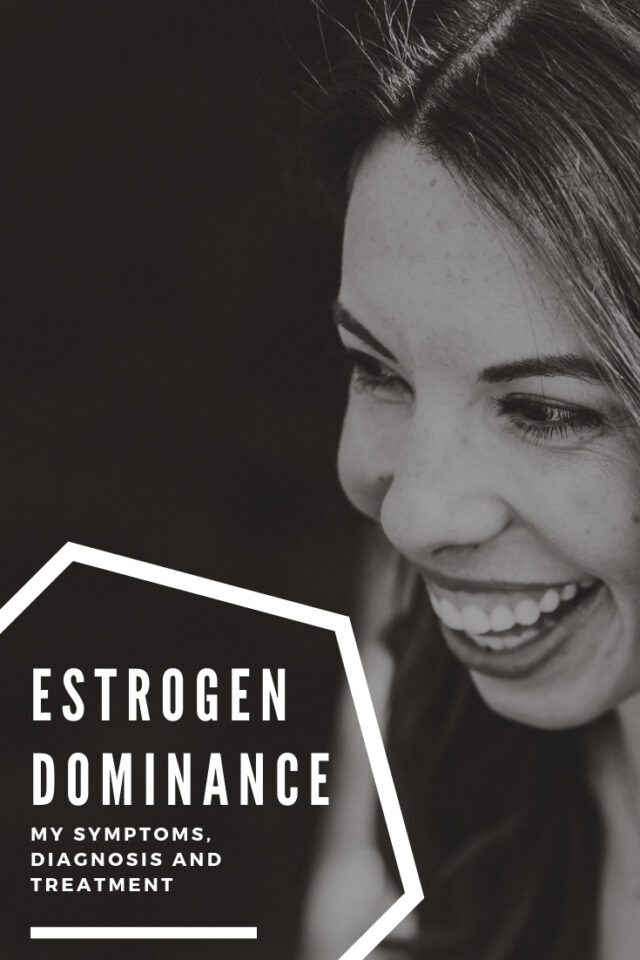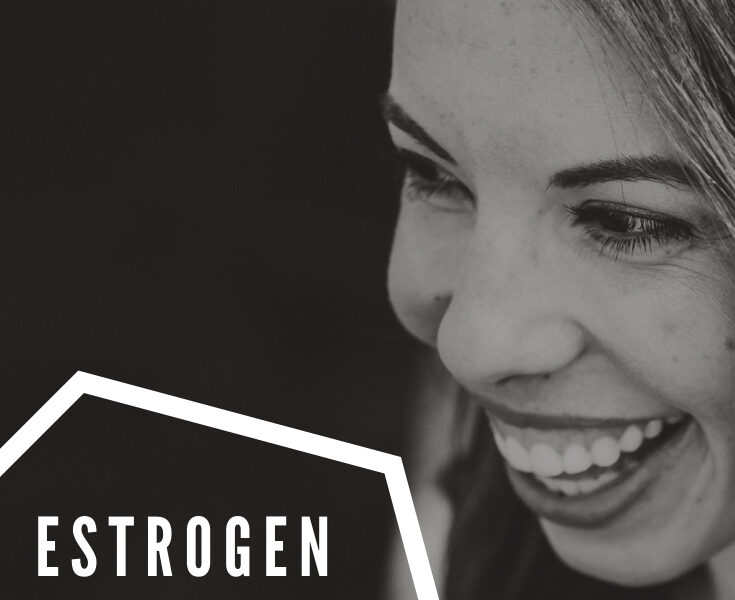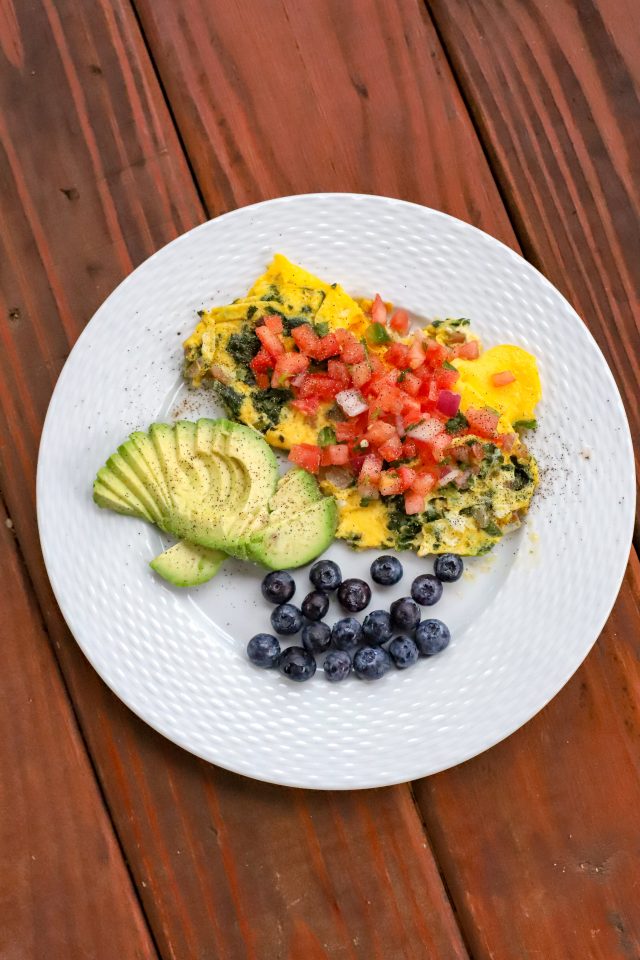While I have been open in my weekly newsletter (have you signed up yet?) and on Instagram about the health journey I’ve been on the past 2-3 months, I have yet to write about my experience with estrogen dominance all in one place. Now that I have a better understanding of what is going on and have started to see physical changes in myself from adjusting my diet and habits, I’m ready to open up about it with a little more detail. If discussing women’s health isn’t your thing, please just skip this post.

My Story of Estrogen Dominance
It started two months ago in November when I experienced some mid-cycle spotting. My cycles have never been typical- always long and a slightly unpredictable, I had never experienced this symptom before. I wasn’t going to pay it much attention and was ready to chalk it up to stress, but when I plugged it into the My Flo app where I track my cycles, it popped up with a warning that said this was not normal and to visit my OBGYN immediately. I’m not an alarmist, but the warning got in my head enough to warrant a call to my doctor- just to check things out.
I got in to see my doctor quite quickly and after an exam and some chatting, he was ready to call it a fluke. However, he did mention that if it happened again to come back in and we’d dig a little deeper.
When I had mid-cycle spotting again in December, I got a little nervous and immediately went back into the office. I had an ultrasound done that immediately revealed multiple cysts on both my ovaries. I have a history of one doctor saying I had polycystic ovarian syndrome and another doctor saying I don’t, so this wasn’t a complete surprise to me, even if it was an interesting confirmation of polycystic ovaries.
My doctor still seemed to think it couldn’t be anything bad because I was young(ish) and healthy, but since I was 35, he said he’d feel better if we did a uterine lining biopsy, though he was quite sure it would come back benign.
Well, a week later my phone rang at 5:30 PM from the doctor’s office and when I answered, it was him, which to me is never a good sign. He said he was very surprised, but the biopsy had come back showing slight hyperplasia, which though isn’t anything terribly worrisome at this moment, is abnormal and surprising.
My doctor asked me to get some base labs done and asked me about my blood sugar history. I had always had self-diagnosed blood sugar issues but hadn’t felt the spikes and falls in years because I learned how to control them with diet. He asked me if I had gestational diabetes, which I didn’t technically though I had a horrific experience with the blood glucose test and was told I didn’t have to take it again.
He ran my fasting glucose (92), fasting insulin (6.6), and my A1C (4.8). While all three came back within the normal range for their office, both my fasting insulin and fasting glucose were considered on the higher side according to doctors that specialize in hormones.
My mind was swirling with questions and the first thing he assured me was that this wasn’t going to turn into cancer overnight or anything, but it was something not to dismiss. He recommended I take three cycles of progesterone then we would do another biopsy in three months to see if it was clear. He also hinted at the fact that he was quite certain I would have to either take hormones, or get a hormonal IUD, or start on Metformin (a diabetic drug to regulate insulin) to keep this issue from occurring again.
I was incredibly disheartened by that. I don’t want to take hormones or medication if I can help it, so I asked if I could use the three months of progesterone to work on getting my blood sugars more stable on my own. He said that would be fine, though he doubted I would be able to make that big of a difference through diet alone because, again, I was already “so healthy and fit” (his words, not mine).
I was (am) determined to give it my best effort so I started researching. I read Mark Hyman‘s books about blood sugar control, I starting listening to podcasts focused on female hormones and estrogen dominance like Naturally Nourished. I scheduled a phone consult with Ali Damron.
And here I am now; a little over halfway through a three month journey to regulate and shorten my cycles, and balance my hormones.
Estrogen Dominance: Frequently Asked Questions
What is estrogen dominance?
Estrogen dominance is essentially having too much estrogen in your body. This can lead to negative side effects ranging from fatigue and anxiety to fibroids, endometriosis, abnormal menstruation, autoimmune issues, and breast, ovarian, or endometrial cancer.
There’s no set number that indicates estrogen dominance, so getting an estrogen level drawn isn’t necessarily helpful. It is the amount of estrogen you have relative to your other sex hormones and is diagnosed through presentation of symptoms.
What are symptoms of estrogen dominance?
They can be different for everyone, but some of the common symptoms of estrogen dominance can include:
- Irregular or otherwise abnormal menstrual periods
- Bloating (water retention)
- Breast swelling and tenderness
- Fibrocystic breasts
- Decreased sex drive
- Headaches (especially premenstrually)
- Mood swings (most often irritability and depression)
- Weight and/or fat gain (particularly around the abdomen, hips, and thighs)
- Cold hands and feet (a symptom of thyroid dysfunction)
- Hair loss
- Thyroid dysfunction
- Sluggish metabolism
- Foggy thinking, memory loss
- Fatigue
- Trouble sleeping/insomnia
- PMS
How did you know you were estrogen dominant?
Again, it’s different for everyone, so if you experience any of the above symptoms, it’s worth mentioning to your doctor. For me, the only real symptom I had was mid-cycle spotting. However, once we started digging more into it, more signs were revealed. My polycystic ovaries, daily bloating (which I really never felt was abnormal, but now that I don’t have it at all anymore is mind-blowing to me), and PMS cramping were all tell-tale signs.
What supplements are you taking?
Please never start on a supplement without consulting your own medical professional first, but I have been advised to take two supplements that are very popular for estrogen dominance: Calcium D-Glucarate and DIM.
What dietary changes have you made?
A lot of you have asked for details on how I’m eating now that I have discovered I’m estrogen dominant. While I’m happy to share what I’m doing (with the guidance of professionals), I don’t want you to blindly apply this to yourself. Each person is unique in what is “healthy” or what changes they may have enact to find out what foods work and don’t work for them.
While I’m personally a fan of all things in moderation, my health dictates that I need to switch things up a little bit right now. I’m willing to give it a solid try and approach my health proactively and in a holistic way in hopes of being able to avoid medication. So with that disclaimer, here’s my current dietary situation:
- I’m adding in high-quality animal protein a couple times a week and using it as an accessory, not as a main event. I’m using Butcher Box and am so far very pleased with the quality.
- I’m also eating a lot (LOT) of non-starchy vegetables, healthy fats like avocado and seeds, and some fruit (mostly berries).
- I’m drinking celery juice on on empty stomach every morning after a 13+ hour non-eating window.
- I’m drinking a lot of water (not my strong suit, but I’m trying) and dandelion root tea 1-2 times per day.
- I’m trying to eat 3 meals a day and limit snacking to give my gut time to rest between meals.
- For the time being I have eliminated dairy, most processed foods, beans, and grains. Once I get everything straightened out I fully expect (hope?) to add back in moderate amounts of quinoa, beans, and brown rice.
What about exercising with estrogen dominance?
Exercise is helpful with reducing estrogen in the body. I’m figuring out exercise so I can stay active while not stressing my body. From what I’ve learned, estrogen, insulin, and cortisol (that stress hormone) are all intertwined. I’m aiming to run 2 times a week and do gentle strength (not HIIT) 2 times a week. I shoot for 10,000+ steps a day (I love my garage treadmill for getting those steps in). I’m also adding yoga in a couple times a week, even if it’s just a quick 10 minute session.
Have you had to make any other lifestyles changes?
Since estrogen can be influenced by your environment, I’m making a few other changes as well. I’m finally getting rid of all the plastic food containers in my kitchen and using glass instead. I had been slowly transitioning, but now I just went for it. I also am starting to experiment with more nontoxic beauty products, lotions, detergents, cleaners, and more.
I also am ensuring I get at least 7 hours or sleep at night and keeping my stress levels in check the best I can. Again, cortisol is a big player with hormones and sleep and inner peace help regulate it.
Now what?
I’m staying this course for another month and a half when I’ll be finished with my progesterone and have a repeat biopsy. If that is clear, I will continue on this path for a few cycles and hopefully see them shorten and regulate. My ovarian cysts should also disappear, so I’ll be asking about having another ultrasound in a few months, too. I’ll update you when I know more!
Did I miss anything? If so, please leave a comment below!
Have you ever dealt with hormone related issues?
If so, what helped you?




Allison says
Thank you for sharing!! This is so helpful and informative. Obviously, everyone’s journey and experience is different, but thank you for giving me some direction, and guidance and for pointing me towards helpful research to do on my own. Much appreciated, and best of luck to you!
Leslie says
Wow, that list of symptoms lists me to a tee.i would never have put them all together as one “thing.” Time to do more research and probably call my doctor.
Heather says
Thank you for sharing your experience! I’ve been questioning some changes in my own body and hormones and my doctor didn’t seem all that concerned, but after reading your symptoms and what you were experiencing, it all sounds very very familiar and considering I was already thinking of getting a new doctor, it seems like now would be a good time after all.
Nadine says
Interesting. I’m trying Keto to combat ovarian cysts and incredible cramps. If that doesn’t offer relief, maybe I need to take this a step further? One month into Keto–less mid-cycle cramping, but still have those fantastic cramps during my cycle. I was offered the same solutions–pill or IUD. Not loving either idea.
Allison says
Lara Briden who wrote “period repair manual” suggest going dairy-free can help with cramps and period problems. I had no idea but I saw that recently on her Instagram!
Brittany Dixon says
Check out the Naturally Nourished podcast by Ali Miller. It’s a LOT of info and a lot of science talk in each episode but I have found it incredibly informative and helpful. Glad to hear you are making progress in a good direction, though! May it continue 🙂
Christy says
DIM saved my life after years of researching my symptoms. Endometriosis happened to me after putting together that my liver wasn’t able to get rid of the extra estrogen because of a gall bladder removal in my early twenties. I didn’t figure it out until I turned 40!
I hope your post helps others.
Brittany Dixon says
I have heard so many people rave about DIM and am excited I finally know about it. Thank yo for sharing!
Alyssa says
I have so been looking forward to this post. I also have PCOS and a lot of this stuff is me to a tee! After “popping” this baby out and getting back to normal, I might have to talk to my doctor about some of this stuff!
Sarah Garrett says
That list of symptoms was the reason I had a hysterectomy at 33. It eliminated a lot of the symptoms and I can somewhat control the rest if I stick to clean eating and eliminating toxins. I truly believe the birth control pill and having my tubes tied after my third child at 25 was what caused all my problems!
marci says
when you say not wanting to take hormones, do you mean being on the pill is something you don’t want to do that would help? just curious why!
Brittany Dixon says
Hi Marci! Yes, that’s correct. I haven’t been on hormonal birth control in years and don’t see myself ever going back to it. I just don’t want any excess and unnatural hormones in my body. I think I’ve had issues similar to this since I was a teenager and hormonal birth control just masked it rather than allowing me to get to the root of the issue. I really am optimistic that lifestyle and diet tweaks can make that a reality for me. Fingers crossed! 🙂
Katie Evans says
Your journey is really interesting to me. I know you are a person who researches things thoroughly, and makes careful choices, so I am hoping that you will share which brands you buy? When I went to look at what is offered, there isn’t much in brands that I know. Thank you so much for sharing!
Brittany Dixon says
Hi Katie! Are you referring to the supplements? I bought them through Ali Damron- http://www.alidamron.com/
I had a consult with her and she sent me the link to the specific supplements that fit me best. I’m sure if you reach out to her she can do the same for you. I hope that helps!
Brittany Dixon says
I also wanted to note that she offers free 15 minute initial consults and it was so helpful for me.
Molly says
Yeah ? Do you recommend working with her? I think I have estrogen dominance too.
Jess says
Have you heard of the MTHFR gene mutation? It’s pretty common and can increase the risk of estrogen dominance (and a number of other family medical history factors suggest I and many of my family members have it). I am by no means an expert, and I don’t have PCOS, but I do trend towards estrogen dominance, so to feel my best I have to take a high quality B complex vitamin (the mutation essentially means you can’t process B vitamins properly, so I need to take the active form of b vitamins, methylfolate vs. folic acid for example), high quality probiotics, and limit/eliminate grains and dairy. If I delete one piece of that puzzle, my cycle seems to revert back. Might be worth it to explore MTHFR and B vitamins – since B vitamins are basically only in animal products (fortified products are usually not the active form), maybe they were getting a bit lower than usual with less emphasis on animal products lately? My sister is a vegetarian and has to be very mindful of B vitamin intake (sorry for the novel!) :).
Brittany Dixon says
Hi Jess, I had not heard of MTHFR so thank you for sharing about it. I was taking a B-Vitamin but maybe it still was not enough? This is all interesting and helpful info that I’m going to research more into. Thanks so much!
Jess says
Yes, they form of the B vitamin is important – if it’s not the active form (and many supplements aren’t), and you have the mutation, you can’t ‘methylate’ properly, i.e. convert the supplement into the active form, thus the supplement already has to be the active form. When you can’t process it properly, you can have high levels of B vitamins in your blood but that doesn’t mean it’s getting into your cells to be used by your body. I take this one (I live in Canada so not sure if it’s available in the US but it will give you an indication of what forms of the vitamins are in it) http://www.nfh.ca/products.asp?id=106.
Alice says
Great post – very interesting. I always love reading about the steps people are taking to try to help things work better “naturally” before committing to using medications. I think diet and proper exercise can do a LOT more than we understand at this point in time. I really hope this works for you! As for less toxic skin care, please, please, please, look at Beautycounter. We are also working to clean up our personal care products over here, and have loved the Beautycounter line. I am happy to meet up with you and provide you with samples if it’s something you’d like to try, but there’s no pressure. You can take a look at their website to see if it’s something that you’re interested in!
Brittany Dixon says
Thank you for the recommendation, Alice! I have a friend sending me some Beautycounter samples right now. I’ve heard such wonderful things about BC, but have never really had the chance to look into it much or try it myself. I’m looking forward to seeing what all the excitement is about 🙂
Lindsey says
Thank you so much for sharing. I also have PCOS and some of the symptoms you mention above. I would love to know more about what your doctors said about diet changes you can make to improve symptoms. Thanks!
Allison says
I’ve been waiting for this post. Thanks for sharing your insight and tips for handling it naturally. I have a blood clot disorder and have been looking at more natural ways, instead of taking extra hormones. Can’t wait to hear about the continued results!
John J. Stathas says
Your sharing has opened up lots of dialogue on the subject. You continue to educate and inspire others to be more mindful of their health.
C says
Hi! This is very interesting! Have you looked into eating raw carrots at all? I found some interesting claims online. 🙂
Brittany Dixon says
Haha, I have not, but I’m already drinking celery so I might as well throw in chowing down on carrots!
Laura says
I’m with you on avoiding hormone therapy if you can find other solutions that will work! The ParaGard (copper, non hormonal IUD) has been an awesome choice for me. The only hormonal issue I have had was with nursing my first, exclusively still at 5 or so months, plus working full time and not getting even close to enough sleep, I had low estrogen. During that time my body was so stressed from all the other stuff that I couldn’t even do a light run without getting sick or feeling run down. In fact, I think the only thing I had going for me was eating well (and eating a lot!). My doctor offered supplements as an option, but also assured me things would return to normal once I was able to nurse less (thankfully she was right)! Agree that different hormone levels often being related to one another (a beautiful balancing act when it all behaves properly). My sister is an endocrinologist so I often bounce hormone questions off her. I have been either pregnant or nursing continuously since 2012 (my 2 year old still nurses once before bed) so I am interested to see if there are any changes when it all stops (hopefully soon!!!).
Brittany Dixon says
Oh how wonderful to have an endocrinologist in the family! Though I already feel I pester my doctor friends enough; I couldn’t imagine if I had a hormone expert to send questions to on the regular 😉
Dana says
Thanks so much for sharing this. Alot of these symptoms you mentioned really fit me to a tee….something I should look into further. Appreciate you sharing your story!
sherry says
Your experience, research, and openness to share has made a lot of people aware of something that may be affecting them. As I look back, estrogen dominance may have been something I experienced but did nothing about (and fortunately for me had no negative side effects).
So much new information available. Keep up the exploring!
Jen says
Just curious–when you say your cycles were long and somewhat irregular, can you be specific? Like, longer than 33/34 days? Many days off from month to month? Curious because of changes in my own cycle.
Brittany Dixon says
Anywhere from 33-38 days would be expected for me most of the time. It was frustrating to have it be so unpredictable!
Meg says
Check out Dr. Jolene Brighten’s new book—Beyond the Pill. She gives lots of hormone advice and it’s become a Amazon Best seller in 3 categories and just came out last week. She talks a out PCOS and estorgen dominance.
Michelle says
I’m sorry you’ve been experiencing symptoms of estrogen dominance, but good for you for doing your own research and being your own advocate.
Have you heard of the natural supplement myo-inositol? It’s a wonderful alternative to metformin and has been shown to work more effectively with less side effects.
It frustrates me how conventional doctors simply want to recommend Rx drugs (metformin, the pill, etc.) Don’t get me wrong, conventional medicine is important and can be life-saving in many situations, but I’ve had a much better experience visiting a naturopath over the past year than I had visiting my primary, my gyn, the derm, and an endocrinologist over the course of a decade.
I too am on DIM (and a couple liver support supplements) and have been since this time last year. As a result, my cycles are regulated and less painful, and my cystic acne is a thing of the past. I’ve learned I have the MTHFR mutation and I’m now mindful of reading vitamin and supplement labels. I’ve learned SO MUCH through my own research and from two local naturopaths…I never would have had my eyes opened like this if I left my health and overall physical/mental well-being in the hands of conventional doctors.
I encourage every woman reading this post to become their own health advocate.
I wish you the best on your healthy hormone journey!
Brittany Dixon says
I have not heard of myo-inositol, but I’ll google it for sure. I also am going to look into the MTHFR gene thing because I keep hearing little whispers about it. Did you do blood work to check for that?
I feel like I have learned a lot but I know there is still so much for me to learn! Thank you for sharing your experience!
Michelle says
I did genetic testing through 23andMe. It was a simple mail-away saliva test. They run specials/discounts every now and then, so be on the lookout. My naturopath recommended Strategene to help us “interpret” the results. I think in total is was about $100. I learned a few other things about myself that made total sense with hindsight.
Good luck!
Shari says
I apologize if this was answered somewhere in these comments, but I didn’t see any reference to if and how much soy you consume. It’s in most all processed foods, even things marketed as “healthy.”
Brittany Dixon says
I’m not eating any soy right now. I will likely add in some organic tempeh here and there, but that’s about it!
Heather says
Hi Brittany! Thank you for sharing. I have hyperplasia as well due to estrogen dominance. I sought care with a naturopath and tried 6 months of DIM, calcium glucarate and a strict clean eating regiment but unfortunately it didn’t take care of my hyperplasia. Now I have to either take progesterone or get the Mirena IUD…I never wanted to put hormones back in my body again. 🙁 What kind of progesterone did you take and what were your side effects? Thank you.
Brittany Dixon says
Hi Heather! I’m sorry you are going through a similar experience. I just started (last week) using the essential oil Progessence from Young Living. I’ve researched it and heard people swear by it, so I’m giving that a try right now and will share my experience once I have a month or two under my belt.
Brittany Dixon says
While I feel hormonal health is a moving target, I’m doing pretty well right now! No noticeable skin issues that.
Rebecca says
Can I ask how long it took you to balance your hormones? I’ve been on a strict regime for over 3 months and I still haven’t noticed a difference.
Brittany Dixon says
I wish I had a concrete answer, but it really felt like trial and error for a year and a half. However, I’m not actively using supplements or special diet now and my hormones seem (based on physical observation, not testing) to be doing really well. Hang in there! Some things I also think helped me were a gut cleanse to optimize my microbiome, strength training, and getting to bed earlier.
Donna Talmage says
An explanation of what DIM is would be good
Brittany Dixon says
Sure! It’s a compound naturally found in cruciferous vegetables that can help ride the body of extra estrogen.
K says
Hello, I’m just now decovering I have an estrogen dominance issue after nearly 30 years of failed diet and exercise. Thank you for providing a detailed log of what you did to get going and supplements etc. I’ll have to do my own leg work, but it’s nice having a guide.
Brittany Dixon says
I’m so glad it’s helpful. It took me a long time to get my hormones sorted, but stay the path; how you feel will be worth it! <3